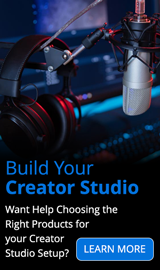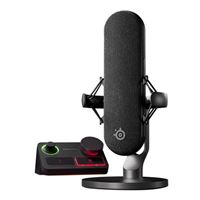Make Your Voice Heard: Shop Microphones and More
What do creators, streamers, podcasters, musicians, remote instructors, and public speakers all have in common? They need great microphones> Since the built in microphones that come in many desktop and laptop computers often are not sufficient for these applications, creatives and performers often need to upgrade their setups.
Whether your application is podcasting, live streaming, live sound, or recording music, we have got a microphone that is perfect for you. Our lineup of microphones encompasses many different types of microphones, including:
Streaming and gaming microphones for play by play commentary on your streams
Studio microphones for crystal clear recordings of vocals and musical instruments
Lavalier microphones, or body mics, and stage microphones for seamless live performances
Shotgun microphones for recording projects in the field
Must have accessories like microphone stands, pop filters, shock mounts, preamps, and more
Choosing the Right Microphone for You
Here are a few key things to think about when choosing a microphone:
Dynamic vs. Condenser: Dynamic microphones are less sensitive and better suited to recording in environments with minimal soundproofing. They are generally robust and don’t require an external power supply. Condenser microphones are more sensitive and provide warmer, richer sound, making them ideal for recording studios and professional streaming setups. Note that condenser mics may need to be connected to a power supply or a device with 48V phantom power.
Polar Pattern: This refers to the location of a microphone’s sensors inside its grille, and thus where it captures sound sources most effectively. The popular cardioid pattern offers good reception over a wide range in front of the mic, while the supercardioid and hypercardioid patterns add an additional pickup zone behind it. A bidirectional mic uses a figure 8 pattern with equal zones on both sides of the mic - perfect for a singer with an acoustic guitar, for example, while an omnidirectional mic uses a 360º pattern that is great for roundtable discussions. Finally, unidirectional shotgun mics pick up only what is directly in front of them, in a single narrow formation.
Frequency Response: A microphone’s frequency response refers to how strongly it picks up various parts of the frequency spectrum, from a soprano singer’s high notes to the rumble of sub bass. 20 Hz to 20 kHz is a common range for general purpose streaming mics. Other models, especially mics designed for performing and recording music, may have a narrower and more specialized response.
Connectors: USB microphones are common for streaming and desktop use. In more studio oriented microphones, the connector is often a traditional XLR microphone cable connector. Many of the microphones that connect to mobile devices or digital cameras use a 3.5mm connector with a few offering Bluetooth connectivity.
Browse Micro Center’s extensive selection of high performance microphones here, with great deals on top names like Shure, Blue, Audio-Technica, and more. Want assistance in selecting the best products for your ultimate Creator Studio haven? Be sure to see our Creator Studio Configurator.


